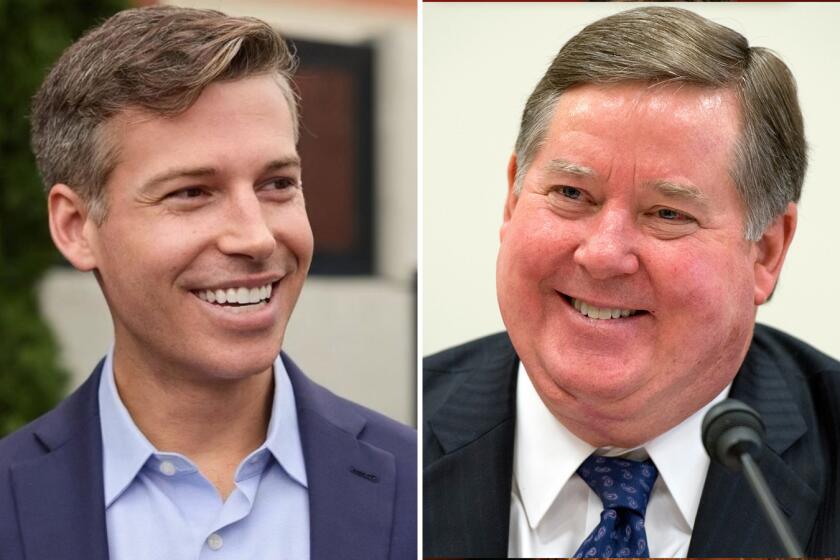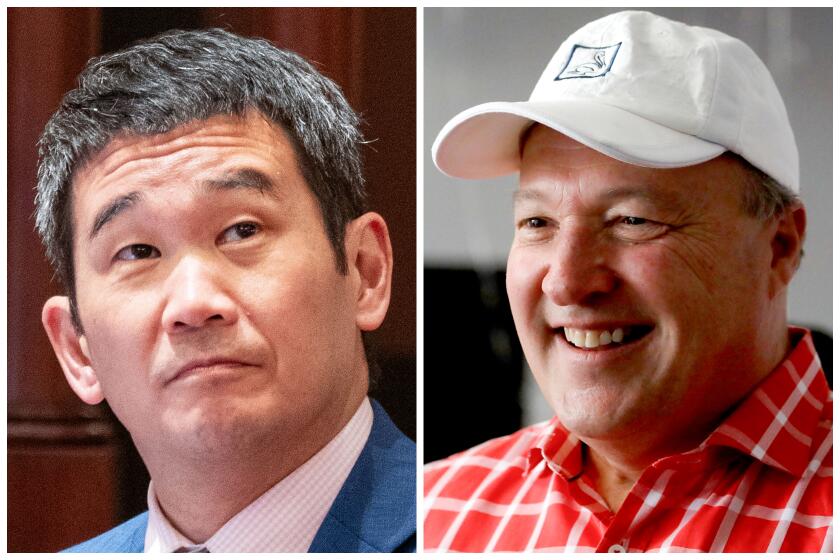After disappointments, hope for dignity and a ceremony
The slights are mostly small, but cumulative. Maybe it’s the blank, slightly confused expression on someone’s face when Jim Smith introduces his “domestic partner.” Or the extra fee that rental car agencies charge if they both want to drive the car, because they are not married. Or the tax forms they cannot file jointly.
Each instance is a little reminder that society sees them, according to Smith, “as less than human.”
He and his partner, Frank Reifsnyder, have been a couple for 10 years. They have graduate degrees and lucrative careers and a beautiful Spanish colonial home in Toluca Lake, with fountains and tiled terraces and vaulted ceilings with hand-hewn beams. They have 14-month-old twins, Milo and Kaylee, whom they adore.
In their eyes, they have all the trappings of a happy marriage -- just not the marriage itself. And they want it.
--
A long wait
On Thursday, Smith, 40, sat in front of his computer at home, waiting to see whether the California Supreme Court would let them marry.
He called Reifsnyder, 36, who was on a business trip in Orlando.
“This is nerve-racking,” Smith told him. “This site is going really, really slow. . . . Are you excited?”
A minute later, he pulled up the 172-page document and started reading. “I have no idea what this means,” he said, scrolling through pages and pages of legalese.
Finally, he homed in on the key page, 120. He choked up. “Can I read you the decision? It’s really good.”
In a 4-3 vote, the state’s high court ruled that language in the law “limiting the designation of marriage to a union ‘between a man and a woman’ is unconstitutional and must be stricken from the statute.”
Smith and Reifsnyder won’t get substantially more legal rights from the ruling. Same-sex couples who register as domestic partners in California have many of the legal rights accorded to married couples, and the ruling will have no effect in the federal domain, including Social Security and income taxes.
But Smith was ecstatic. He said the significance of the ruling is much deeper.
“I think this signals the beginning of the end of ostracism and bullying and all the things used to make people feel less human than others,” Smith said.
But he knows the issue is far from settled. Many people believe same-sex marriage would demean a sacred institution, and an initiative expected to qualify for the November ballot aims to amend the state Constitution to ban same-sex marriage.
“Having a majority of the people you live with say you are less worthy of participating in this economy and society,” said Smith, “that would make it pretty hard to stick around.”
--
‘Devastating’ treatment
For Smith, the issue is all a matter of dignity.
“Domestic partnership is a facsimile of marriage,” he said. “There is no reason to have that artificial structure except to humiliate gay and lesbian couples.”
Smith, the chief technology officer at a web advertising company, and Reifsnyder, a public relations specialist at Disney, met in Washington, D.C. They immediately clicked, but took the relationship slowly.
“We’re not martini go-go boy type of gays,” Smith said. “We’re really boring people. It took us a while to realize we were on the same wavelength. And once we did, we were inseparable.”
Smith and Reifsnyder moved to Los Angeles and became domestic partners in 1999. They signed the papers on the lid of a photocopier in Glendale.
Five years later, when they heard that San Francisco was permitting same-sex weddings, they jumped at the chance. They flew up two days later.
They said they would have loved to have waited for a big ceremony with family and friends, but they didn’t know how long the window would be open.
Not long, it turns out. A few months later they were informed that their wedding was illegal, and their marriage had been annulled. They said they were demoralized, but not surprised.
“It gets really emotionally devastating, unless you have someone else beside you going through all this stuff,” Smith said.
--
Hope for the future
Smith and Reifsnyder always knew they wanted a family. They found an egg donor and a surrogate mother. They moved from West Hollywood to a tree-lined street in Toluca Lake.
“In West Hollywood, we saw one kid in a three-block radius,” said Reifsnyder. “In Toluca Lake, kids were riding their bikes through the neighborhood. People were walking their dogs.”
Now they take hikes with the twins in baby-backpacks every weekend, hit the trains of Travel Town in Griffith Park, and go to their Episcopal church in Beverly Hills every Sunday.
They hope Thursday’s ruling will make marriage possible once and for all. This time, they want the full ceremony.
Smith has Disneyland’s wedding service waiting on speed dial.
“A ceremony is better than getting domestic-partnered over a photocopier in Glendale,” he said.
More to Read
Sign up for Essential California
The most important California stories and recommendations in your inbox every morning.
You may occasionally receive promotional content from the Los Angeles Times.











